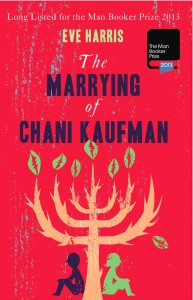 Published by Sandstone Press 5 August 2013
Published by Sandstone Press 5 August 2013
350pp, paperback, £8.99
Reviewed by Lesley Bown
It takes Tristram Shandy an awful long time to be born and there is a similar delay between the opening pages of The Marrying of Chani Kaufman, which find the eponymous heroine in the middle of her marriage day, and the moment right at the end where we finally find out what ensued. In between, we learn not only how she ended up where she did but much about her north London super-orthodox Jewish community.
Chani herself is not yet twenty, naïve, intelligent and rebellious in a small way. She has, for instance, chosen not to finish her education at a Jewish seminary, which would set her up for a good marriage, and yet she doesn’t resist the idea of a marriage arranged for her via the services of Mrs Gelbmann the matchmaker.
In the event she is spotted by Baruch Levy, only slightly older than her, equally innocent, but based on the merest glimpse of her eating a dessert he is prepared to fight to get her.
Both the young people have endured the stifling, enclosed and protective upbringing imposed on them by being orthodox in a largely secular world. North London is vibrant, multi-cultural and corrupt but they are totally shielded from it. Chani isn’t quite sure what a penis is or what it does (presumably street dogs never mate in Golders Green) while Baruch’s friend Avromi has never heard of the contraceptive pill. TV is banned, likewise the Internet, and education is largely about learning to be Jewish. Even Avromi’s desire to be a lawyer is frowned on by his rabbi father.
It’s quite difficult to engage with Chani and Baruch as they stumble their way through the ordained process of courtship – three, at the most four dates are allowed before a decision has to be made. Both are thin characters, a little clichéd despite their unusual upbringing. Their parents are also stereotypical – Mrs Kaufman grotesquely fat and exhausted by childbearing, Mr Kaufman kindly but distant, preoccupied with the endless costs of marrying off eight daughters, Mrs Levy materialistic and groomed to glittering perfection, Mr. Levy (the only character who has to deal with the sordid world of money making) coarse and absorbed in his business.
Far more interesting and original are the Zilbermans. Rabbi Zilberman instructs Baruch in the duties of a married man, and his wife oversees Chani’s education. (Despite this link, and the small size of the community, the Levys and the Kaufmans seem not to know each other at all.) Through a series of flashbacks we learn about their relationship, about his deepening faith and her struggle to follow him. Running in parallel is their son Avromi’s story, as he emerges dazed and blinking into the bright lights of secular student society.
The writing style seems clunky and flat and Harris relies heavily on descriptions of her characters’ inner thoughts. Yet she is very good at using rooms to express the people who inhabit them– the Kaufman’s shabby home, Mrs Gelbman’s overstuffed living room, the Levy’s expensive pale interiors.
Behind all of the plot lines, and bigger than any of them, is the orthodox Jewish community. Exhausted both by the demands of a religion that controls every moment of life and by the need to close themselves off from the world around them, its members have no time for each other. Many small hypocrisies are practised, surface show is everything and above all there is no support for anyone who is suffering or in trouble. Their lives seem joyless, constrained and diminished.
We also see the contrast with life in Jerusalem, where religious practices are embraced joyfully and people still have energy to care about each other. Although the London Jews think they are keeping themselves apart from the mainstream, they are in fact deeply affected by it. This is the core story of The Marrying of Chani Kaufman, but there are too many distractions and discursions along the way, and too much schlocky – that is to say trashy – stereotyping.
